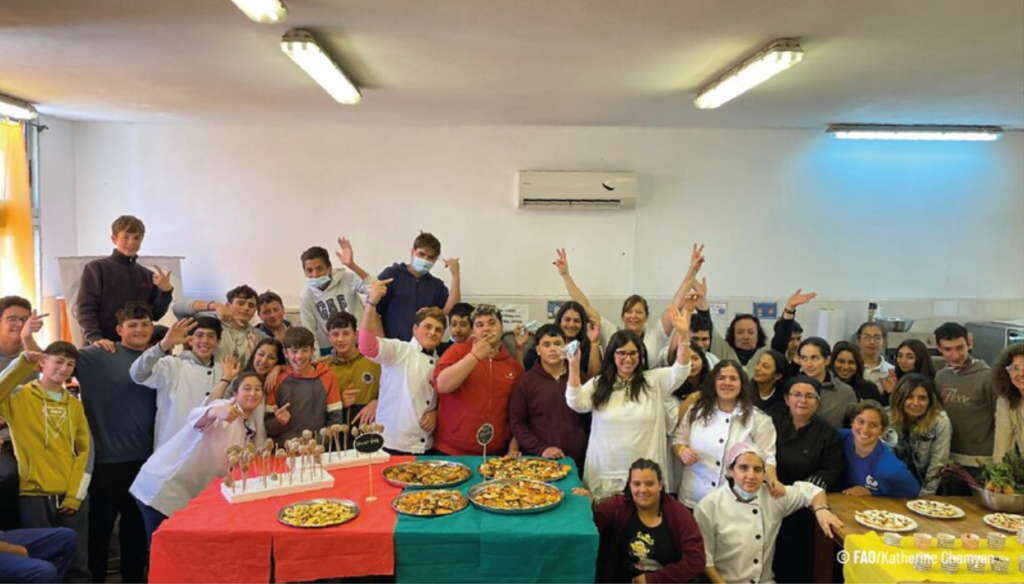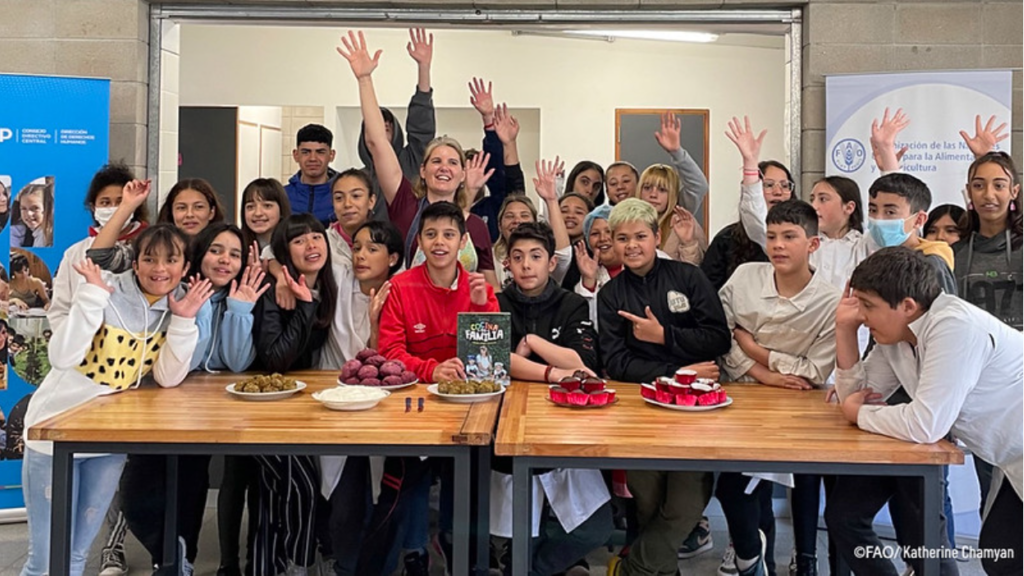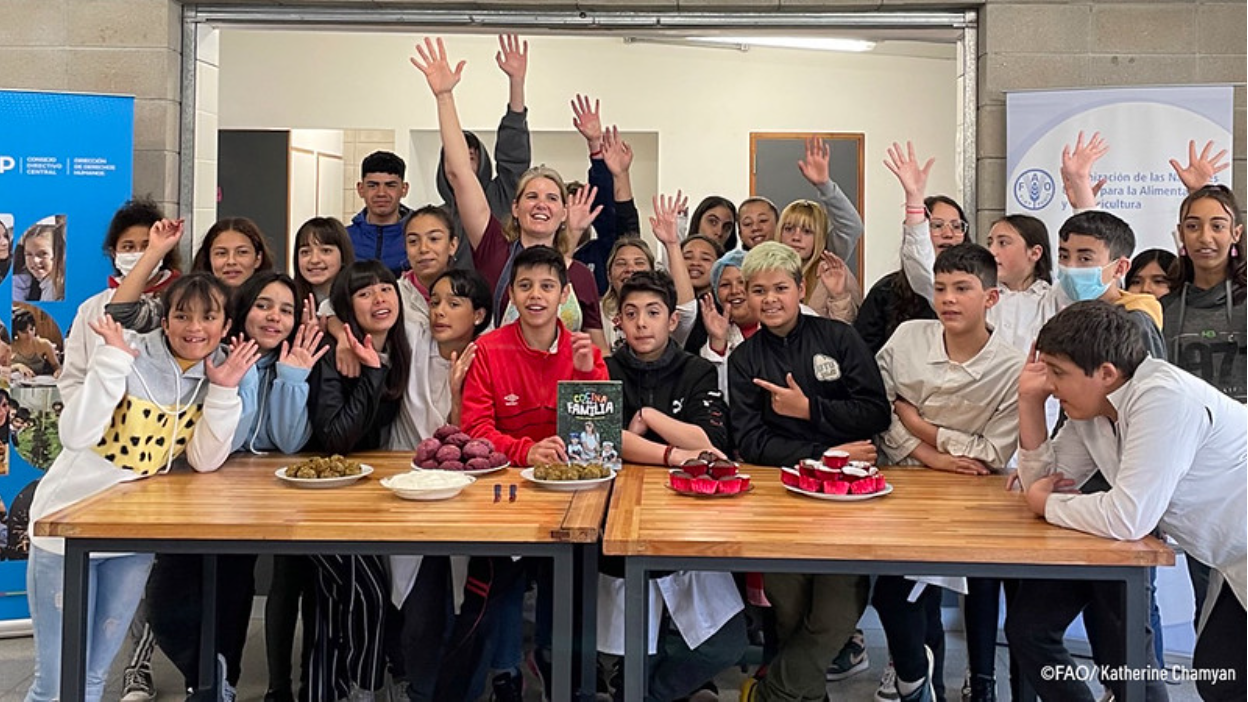Background
This is a project that seeks to generate capacities in educational communities to adopt, replicate and promote healthy eating practices that have a positive impact on their surroundings, health, and environment.
The initiative conceives food and nutrition education as a process through which individuals and their community acquire, reaffirm or renew their knowledge, attitudes, skills, and practices. In addition to impacting the production, selection, purchase, conservation, preparation, and consumption of food throughout society. This food education must take into account the cultural patterns of each individual, their needs, and the availability of resources in each place.
FAO Strategic Framework 2022-31 seeks to support the 2030 Agenda through the transformation to more efficient, inclusive, resilient, and sustainable agri-food systems for better production, better nutrition, a better environment, and a better life, leaving no one behind.
Its action aims, in particular, to end hunger and malnutrition, in line with Sustainable Development Goal 2. In turn, collaboration with the education sector is in line with FAO’s commitment to the development of healthy environments that promote the practice of healthy eating habits in Uruguay.
Activities carried out (What, when, and where?)
Eight workshops were held in 6 departments of the country with about 240 young people in one month.
The high schools and technical professional education centers (UTU) selected were:
1. Liceo Pan de Azúcar (Maldonado)
2. Baltasar Brum High School (Artigas)
3. UTU Santa Lucía (Canelones)
4. Liceo Nº 2 of Progreso (Canelones)
5. UTU Maroñas (Montevideo)
6. UTU of Dolores (Soriano)
7. Lyceum Nº 4 of Rivera (Rivera)
8. UTU Paso de la Arena (Montevideo)
The workshops were led by Jacinta Luna, Laura Rosano, Sylvana Cabrera, and Diego Ruete. Each of these specialists in the field conducted two workshops.
Methodology applied
The principle is based on experience referent to healthy eating. With experience in conducting workshops, they intervene in high schools and technical high schools throughout the country, so that students can experience that you can cook easy, tasty, and healthy, with seasonal products and even something fun.
The idea is that they themselves can then share the experience with their peers and their communities. For this, materials are shared for social networks, they are encouraged to record the workshops with photos and videos. The entire experience is framed under the hashtags #HealthyEnvironments and #ComerInteligente.
Within the framework of FAO’s support for the communication of the initiative, two filters were designed for Instagram (Eating smart and Healthy Environments), published on the organization’s global account.
All the workshop participants were integrated into the same WhatsApp group that will be followed up, promoting activities to consolidate a network of young people committed to eating smart and a questionnaire has been shared with them to find out their impressions regarding the workshops. .
The axes to be considered by each referent when organizing their workshops were:
– A healthy environment is composed of good nutrition and physical activity.
– The importance of local and seasonal food supply.
– Collecting and valuing local and intercultural traditions.
– Avoiding food losses and waste.
– Emphasize the moment of sharing meals.
– Co-responsibility from a gender perspective.
– Labeling and misleading advertising.
Institutions involved
The initiative is a joint effort between the Food and Agriculture Organization of the United Nations (FAO) and the National Administration of Public Education (ANEP) of Uruguay, so the project’s objectives are aligned with the Education Plan 2020-2025 for public education and the Country Programming Framework that governs FAO’s cooperation with Uruguay.
Qualitative and quantitative data
Description of beneficiaries (number and audience)
Around 240 young people from middle and secondary general and technical education, from all over the country, participated in the workshops.
Results achieved
Creation of a network of young promoters of healthy environments in their communities, who are agents of change for smart nutrition at the nutritional, productive, and environmental levels.
Active student participation in decision-making and institutional proposals.
Dissemination of the initiative nationally and internationally.
Challenges and progress
A WhatsApp group has been formed with the participation of the young people, which allows them to keep in touch. Many completed a questionnaire to evaluate the workshop.
In addition to presenting this initiative at the World Food Day central event in Uruguay to all partners and the media, an international dissemination table will be held and the idea is that this experience can continue and grow in 2023.


https://drive.google.com/drive/folders/1M4udo4zC9p4jUBAIEyEBMd_UMzdreQ
https://www.flickr.com/photos/196366477@N08/albums/with/72177720301402433



